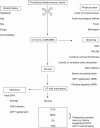Reversible cerebral vasoconstriction syndrome - A narrative revision of the literature
- PMID: 32258552
- PMCID: PMC6806951
- DOI: 10.1016/j.pbj.2016.04.002
Reversible cerebral vasoconstriction syndrome - A narrative revision of the literature
Abstract
Reversible Cerebral Vasoconstriction Syndrome (RCVS) is a not very well known clinical-imaging entity; it is characterized by thunderclap headache, which mimics an aneurysmal subarachnoid haemorrhage, and a diffuse and segmental constriction of cerebral arteries, that resolves spontaneously within 3 months. The pathophysiology remains unknown. The female gender is the more affected and more than half of cases occur in the puerperium or after exposure to vasoactive substances. Typically, RCVS is self-limited and has a benign course, although it may have more serious complications with permanent neurologic sequelae and death. Treatment is predominantly supportive and directed to the symptoms.
Keywords: Complications; Female; Reversible Cerebral Vasoconstriction Syndrome; Thunderclap headache.
Copyright 2016 PBJ-Associação Porto Biomedical/Porto Biomedical Society.
Conflict of interest statement
The authors declare no conflicts of interest.
Figures
References
-
- Sociedade Portuguesa de Neurologia. 3rd ed. Classificação internacional das cefaleias. vol. 14 (Suppl. 1). 2014. 74-75.
-
- Ducros A. Reversible cerebral vasoconstriction syndrome. Lancet Neurol. 2012;11:906-917. - PubMed
-
- Singhal AB. Postpartum angiopathy with reversible posterior leukoencephalopathy. Arch Neurol. 2004;61:411-416. - PubMed
-
- Nowak DA, Rodiek SO, Henneken S, Zinner J, Fuchs HH, Topka H. Reversible segmental cerebral vasoconstriction (Call-Fleming syndrome): are calcium channel inhibitors a potential treatment option? Cephalalgia. 2003;23:218-222. - PubMed
-
- Razavi M, Bendixen B, Maley JE, Shoaib M, Zargarian M, Razavi B, et al. CNS pseudovasculitis in a patient with pheochromocytoma. Neurology. 1999;52:1088-1090. - PubMed
Publication types
LinkOut - more resources
Full Text Sources

